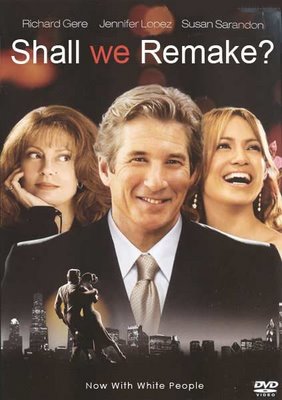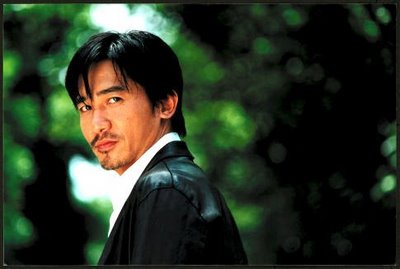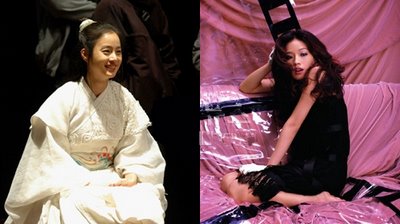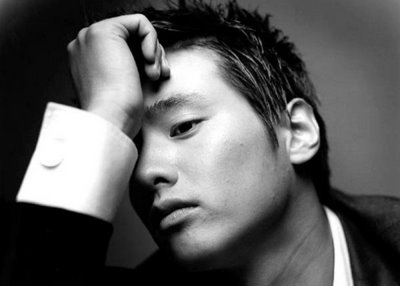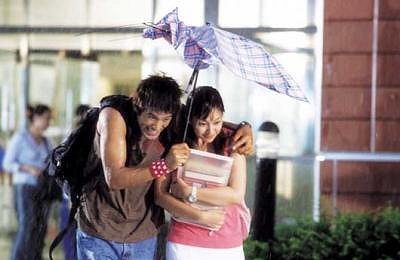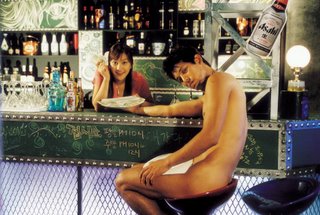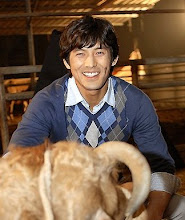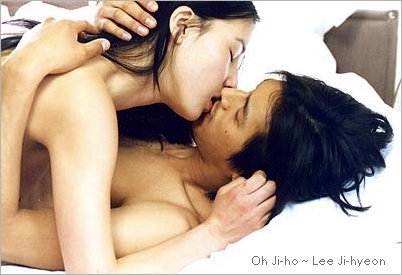
La Belle (Mi in)
Commentary by A. Murray
April 27, 2006
What a much discussed and often misunderstood movie!
Because there is frequent nudity and apparent sexual activity, untold numbers of people have labeled it either as pornography or soft-core pornography whether they’ve seen the film or not. Korean law prohibits full frontal nudity in movies made there, so you see breasts and buttocks, nothing more. The sex in La Belle is definitely not the real thing.
The movie is NOT pornography. Hard-core pornography deals with very explicit sexual acts. Pornography consists of displaying intimate parts of the body during sexual activity. It relies greatly on tiresome close-ups that usually resemble pink machine parts hammering into other pink machine parts. I will not stoop to a critique of porn flick background music, or the moaning groaning vocal overlays.
La Belle does none of this.
Something a lot of people don't seem to understand about La Belle, is the fact it’s surreal. When recognized as surreal it reaches a level where it must be processed through intellect first. Surrealism demands that of the viewer. Because it is abstract, it keeps you saying to yourself, did I really see that? Do I understand this, or am I totally off base?
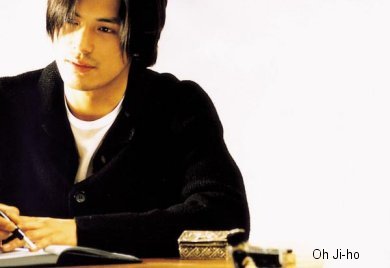
In this case, it's a frequently surrealistic erotic story that could be simply told. Journalist meets woman. Woman is a nude model.
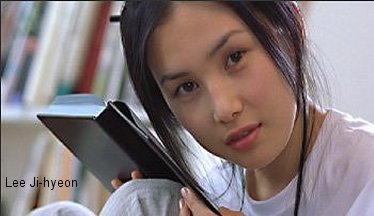
Woman loves a man who cares very little about the fact she exists, other than using her for sex.
Journalist becomes obsessed with woman to the degree that he no longer functions in his professional capacity as a writer. They both go down the tubes.
End of story.
But...
Seeing La Belle is like being submerged in a pool of sensuality surrounded by beautiful imagery. The director, Yeo Kyun Dong, has a fine eye when it comes to line, and gives us an uncluttered elegant framework for the film. Dancer, Ahn Eun Mi, contributed her talent as a "body choreographer", working with the stars Oh Ji Ho and Lee Ji Hyeon for a month, teaching them how to move fluidly. It is this kind of attention that makes La Belle something very special.
The vision of the director, the talent of the choreographer, and the abilities of composer/pianist, No Yeong Shim, who wrote and performed the music, acting in concert with each other, gives us a beautifully crafted view of sex and love in their many variations and tones.
The film opens with a shot of a writing desk and chair. The camera approaches slowly, finally showing an open book with a fountain pen lying across the page. The doorbell rings several times. We hear the voice of a man. He says, “she’s back”. And so begins the tale of a journalist, and a model….
The man (Oh Ji Ho) is obsessed with the woman (Lee Ji Hyeon) with whom he is having an affair, while at the same time wanting to be free of her. He is filled with self-loathing, seeing himself as weak. The relationship is mainly sexual in nature, devoid of any real connection, and therefore, ultimately frustrating. The gratification of the act of sex dissipates quickly, and both are left empty.
 Click on photo to enlarge.
Click on photo to enlarge. While he wishes his love were reciprocated, it is not. He fantasizes about her being the woman he wants her to be in apparent real-time scenarios woven into the actual scene being played out, as he copes with the truth. She is not who or what he longs for her to be.
She wishes for the man she can’t have...the lover of her choice, the abuser who beats her and uses her in an offhand way. She waits for calls from him, and lives with one ear tuned to her cell phone. When he does call, she leaps into action, racing to dress, put on make-up, and leaving as fast as possible to get to him.
This is witnessed time after time by the writer, whose home she has moved into since she seems to have nowhere else to go.
These afflicted lovers have terrible emotional scenes. When the woman returns after a visit with the other man, either drunk or beaten physically, the writer is always there and takes care of her in spite of his desire to be shed of her. They both seem to sink deeper and deeper into a swamp of inner disgust and driving sexual desire.
Director Yeo Kyun Dong uses visual clues throughout that may or may not be picked up by the viewer. In one scene the couple is out walking, one on either side of the street, although they are theoretically walking together. What could describe the separation between these minds and souls better than such a simple device? He also did interesting things with audio other than merely supplying us with a remarkable musical background.
The very sounds in the film--the clattering departures of the woman, her slamming of the door, her frequent shrillness, her noisy occupation of another's space…is jarring. All this, opposed to the introspective silence of the writer and his isolation when he is alone or quietly writing as his lover sleeps, is calculated and clever, simply because it works on the subconscious, and tells us so much about the characters, without saying a word.
 Click on photo to enlarge.
Click on photo to enlarge.When viewed through the intellect first, without expectation, but with the mind open to the surreal, this becomes a little gem in it's own right. The majority of gems taken from the earth are flawed. It goes without saying that it is a most beautiful film physically, but also that it is flawed.
Some of the flaws lay in the acting ability of Oh Ji Ho who was relatively inexperienced at the time La Belle was made. He was widely criticized for this by online critics, and it took some of the bloom off the rose. Fortunately, he is a doggedly stubborn individual, who doesn’t quit or let go easily, and has made remarkable strides in his work. What he did have then, and still has, is beauty.
In my opinion, he was simply too young for the role even though he looked older than his twenty-four years. In the love scenes, he was exquisite. I have never seen any to compare with them. Where some of the film is done with voice-over narrative, Oh Ji Ho shows his stuff while reciting the lines. In this, he exonerates himself. He reads beautifully. His voice is like honey. His tempo is flawless.
Lee Ji Hyeon, on the other hand, is unquestionably excellent as the desperate woman filled with longing for the man she loves so futilely, while living with a man she eventually feels nothing less than disdain for, a man she uses as a sexual soporific to quell the pain of her life. Her acting ability stuns, as one would be stunned if dropped into a vat of ice water. She takes your breath away. Seeing this talented dynamic woman at work causes you to fall under the spell she weaves. She’s a powerhouse of phenomenal magnetism and energy.
 Click on photo to enlarge.
Click on photo to enlarge. Oh Ji Ho and Lee Ji-Hyeon are good-looking people. Both have nice bodies. They are agile and graceful, and totally believable in the love scenes, which are incredibly sensuous and caressing. This is where the choreographic expertise of Ahn Eun Mi shows brilliantly. Even so small a detail as the positioning of the actors’ hands during the love scenes comes into play with a huge payoff. The physical aspects of the love scenes are stunningly beautiful. They are always riveting.
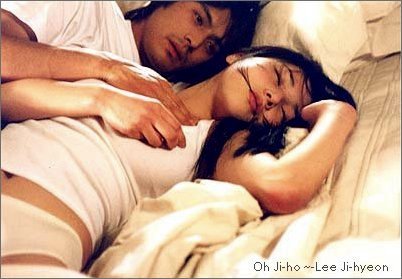
So, one might say the film is choppy in a sense. When it flows it’s divine, when it stalls it becomes awkward.
Since the reader may not have seen this movie, I will refrain from divulging more of the plot, or the events that take place. I suggest you see it.
Technical Note:
My copy is the Spectrum version from Korea. Generally, Spectrum does a fine job, with excellent picture and sound quality. This version has both. Unfortunately though, it has the worst subtitles I’ve ever seen. They confuse rather than clarify.
I’ve watched the film three times, the last time without subtitles since I'm now familiar with the story line. I was able to enjoy it a lot more without reading the titles. Because I enjoy listening to the Korean language, I kept the sound on.
Brought to you by The Hyacinth Papers.










